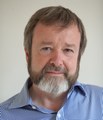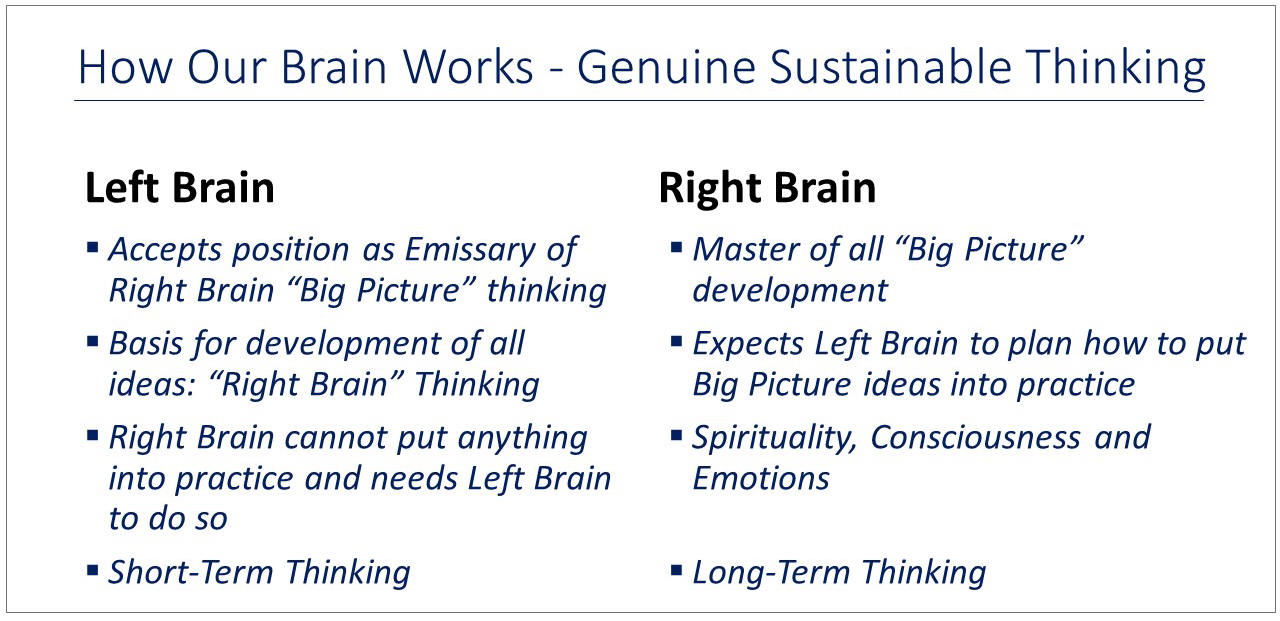Moving Towards Sustainable Watershed Systems: “We need to re-learn basically ‘how we think’, using both the right and left hemispheres of our brain,” says Eva Kras, author of THE BLOCKAGE
Note to Reader:
Eva Kras is a visionary, scholar, university professor, lecturer, traveler and author of THE BLOCKAGE–Rethinking Organizational Principles for the 21st Century. Over the past 5 years, Eva Kras has contributed her knowledge and wisdom to CAVI-Convening for Action on Vancouver Island, an initiative under the umbrella of the Water Sustainability Action Plan for British Columbia.
In May 2015, Eva Kras represented the International Society for Ecologic Economics when she presented her paper on How We Think: How It Affects Sustainability at MIC 2015 – Managing Sustainable Growth. This international conference was held in Slovenia.
Her paper is relevant to those who are leading implementation of land development practices that achieve desired ‘Design with Nature’ outcomes, where settlement and economy are in balance with ecology.

Eva Kras interacts with the audience at the CAVI-Convening for Action on Vancouver Island Forum within the 2012 Vancouver Island Summit hosted by the Vancouver Island Economic Alliance
Design with Nature: Leading change in development practices starts with an understanding of “How We Think”
At the end of the 20th century the sustainability concept was mainly a basis for developing policies consistent with a continued use of resources into the future without causing environmental crisis. But the situation has evolved, and the global economic crisis in 2009 was the ultimate consequence of short-term economic thinking.
“The MIC 2015 focus is on the need for a new form of economic development, addressing the needs of the present without undermining the needs of the future. Sustainable development requires us to take a long term view of the economy, rather than adopting short-term fixes,” says Eva Kras.
Human Brain has Two Hemispheres
 The paper by Eva Kras deals with the revelations resulting from new research by Dr. Iain McGilchrist into the two types of thinking processes – Left Hemisphere (short-term + pragmatic = ‘show me the money’) and Right Hemisphere (long-term + holistic = ‘leap of faith’). Her paper is intended to provide a bridge between the research and its potential for application in the world of business.
The paper by Eva Kras deals with the revelations resulting from new research by Dr. Iain McGilchrist into the two types of thinking processes – Left Hemisphere (short-term + pragmatic = ‘show me the money’) and Right Hemisphere (long-term + holistic = ‘leap of faith’). Her paper is intended to provide a bridge between the research and its potential for application in the world of business.
“The research by Iain McGilchrist can answer a lot of questions for our everyday lives and work related to business,” continues Eva Kras. “He draws attention to the pressing need to achieve a new viable balance between the two types of thinking processes. Which is the Master and which is Emissary? Mainstreaming the research results has the potential to change how we view and achieve Sustainability.”
Towards Balanced Thinking: Use Both Hemispheres!
“Our present global and societal problem is that short-term thinking governs much of what we do. In many organizations, the long-term view has somehow become excluded over many generations. And in society as whole, it seems that only Left Hemisphere logical, rational thinking has been accepted as valid.”
“Both ways of thinking are important, but the sad part is that we have convinced ourselves that the Left Hemisphere can do EVERYTHING. The new research by Ian McGilchrist now ‘turns the table’ because it demonstrates the true and indispensable role of the Right Hemisphere for ALL sustainable development work. A key finding is that we need to re-learn basically ‘how we think’, using both hemispheres.”
“This would switch things around to achieve a viable balance between the two types of thinking processes: THE RIGHT HEMISPHERE ‘sees the big, long term picture’ of the world, and THE LEFT HEMISHERE finds ways of putting these ideas gained from the Right Hemisphere, into practice,” concludes Eva Kras.
To Learn More:
To download a copy of the conference paper by Eva Kras, click on HOW WE THINK: How It Affects Sustainability.
Settlement, Economy and Ecology in Balance
 “Settlement and ecology are equal values and they must be as much in balance as possible for wellbeing of human and natural systems. Settlement is human actitivity of any kind upon the land. It is habitation. Ecology is natural systems. It is water, climate, flora and fauna…and their relationships,” states Tim Pringle, Past-President of the Partnership for Water Sustainability in British Columbia.
“Settlement and ecology are equal values and they must be as much in balance as possible for wellbeing of human and natural systems. Settlement is human actitivity of any kind upon the land. It is habitation. Ecology is natural systems. It is water, climate, flora and fauna…and their relationships,” states Tim Pringle, Past-President of the Partnership for Water Sustainability in British Columbia.
“While we are very good at measuring settlement, mainly in financial terms, we have not been that effective in quantifying the ecological impacts. This disconnect in measuring what matters has historically resulted in an unbalanced approach when making development and infrastructure decisions.”
“The principle of balancing settlement change and ecology helps clarify the relationships that exist among the players (practitioners), politicians, regional and local planners, First Nations communities, agriculturalists, resorts, water districts, businesses and residential property owners.”
To Learn More:
To read an article by Tim Pringle that elaborates on the above statements, click on How does a community weigh the benefits and liabilities of change driven by demand for land use?
THE BLOCKAGE: Rethinking Organizational Principles for the 21st Century
 It is generally accepted that there is a serious worldwide crisis related to environmental breakdown. In the midst of this crisis most major decision makers seem unable to find viable solutions despite developing sustainable sounding policies. Where is the blockage?
It is generally accepted that there is a serious worldwide crisis related to environmental breakdown. In the midst of this crisis most major decision makers seem unable to find viable solutions despite developing sustainable sounding policies. Where is the blockage?
In her book THE BLOCKAGE, Eva Kras searches beyond organizational policy levels to the principles and values on which the policies of major decision makers are directly dependent.
Wisdom of Visionaries
Based upon the observation and wisdom of visionaries such as Willis Harman, E.F.Schumacher and Albert Einstein, Eva Kras makes the case that sustainable governance calls for a serious rethink of our societal values and governance processes.
 “A major shift in values is essential if we are to move beyond the purely scientific approach, based upon quantitative analysis, towards a more integrated and inclusive model founded upon the collective good, interdependence and respect for ecology,” observed Eric Bonham, a founding member of the CAVI Leadership Team, after a visit to BC by Eva Kras in 2009.
“A major shift in values is essential if we are to move beyond the purely scientific approach, based upon quantitative analysis, towards a more integrated and inclusive model founded upon the collective good, interdependence and respect for ecology,” observed Eric Bonham, a founding member of the CAVI Leadership Team, after a visit to BC by Eva Kras in 2009.
“The dialogue prompted by THE BLOCKAGE is timely, given the current global turmoil as a result of greed, fear and exploitation, to the detriment of society, the economy and the environment. The current situation raises the fundamental question. Can we realistically expect sustainable outcomes if we are using conventional governance models to put sustainable values into practice?”




